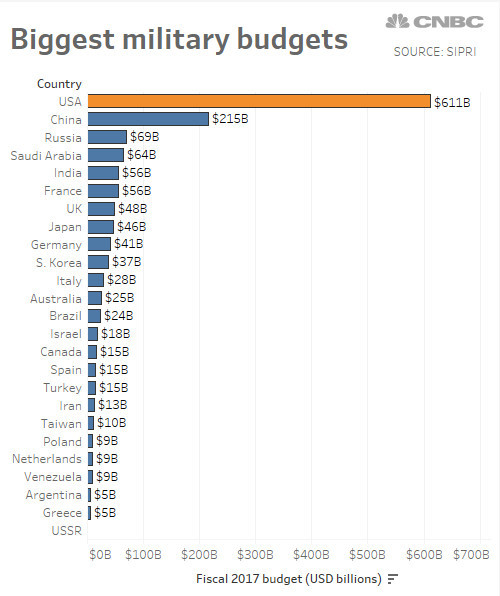War does not determine who is right. War determines who is left!
The subject of how much we should spend on our military budget has always been a hotly debated topic. In fact, the subject in question has been buffed, defanged, neutered and whupped so many times that I get incredibly, indescribably and excruciatingly nauseated when the topic rears its ugly face.
Nevertheless, at the risk of becoming physically ill, I wanted to share the following information with you, as I found it to be quite interesting. In March 2017, President Trump submitted his request to Congress for $639 billion in military spending, which according to Bloomberg, amounts to $54 billion (10 percent increase) for fiscal year 2018 and $30 billion for fiscal year 2017 (September). How about this fact? . Yep, sip on that one for a while, swirl it around, do not spit it out. Savor the taste. Incredible, is it not?
I put forth that there are usually at least two sides to every issue. Moreover, folks on each side believe in the deepest recesses of their souls that they are right. For example, looking at how much we should spend on military defense, if we spend too little, our adversaries may be encouraged to exploit our weaknesses, costing us to lose more soldiers along with potentially giving up our position as the world’s best military. To the contrary, if we invest too much in our defense spending, the misallocation of resources will add to our national debt and possibly place us in an adverse financial position.
Yes indeed, it is a difficult balance to accomplish, which is why I suggest we apply The Goldilocks Principle to this remarkable, problematic issue. For those of you not familiar with the well-known children’s story, “The Story of the Three Bears,” there was a little girl named Goldilocks that tasted three different bowls of porridge, and she finds that she prefers porridge that is neither too hot nor too cold but has just the right temperature.
In other words, let’s not spend too much or too little, but just the right amount. Sure, that’s easy in theory but incredibly difficult, which is why this topic is often contested. Nevertheless, look at the following chart provided by Stockholm International Peace Research Institute (SIPRI).








